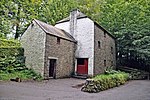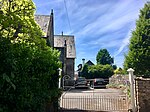St-y-Nyll Platform railway station
1900s disestablishments in Wales1905 establishments in WalesDisused railway stations in CardiffPages with no open date in Infobox stationRailway stations in Great Britain closed in 1905 ... and 3 more
Railway stations in Great Britain opened in 1905Use British English from May 2022Wales railway station stubs
St-y-Nyll railway station, also known as St-y-Nyll Platform railway station and St-y-Nyll Halt railway station, served the village of St. Brides-super-Ely, Vale of Glamorgan, Wales, in 1905 on the Barry Docks Railway.
Excerpt from the Wikipedia article St-y-Nyll Platform railway station (License: CC BY-SA 3.0, Authors).St-y-Nyll Platform railway station
Crofft-Y-Genau Road, Cardiff St Fagans
Geographical coordinates (GPS) Address Nearby Places Show on map
Geographical coordinates (GPS)
| Latitude | Longitude |
|---|---|
| N 51.4953 ° | E -3.2741 ° |
Address
Crofft-Y-Genau Road
Crofft-Y-Genau Road
CF5 6DZ Cardiff, St Fagans
Wales, United Kingdom
Open on Google Maps










